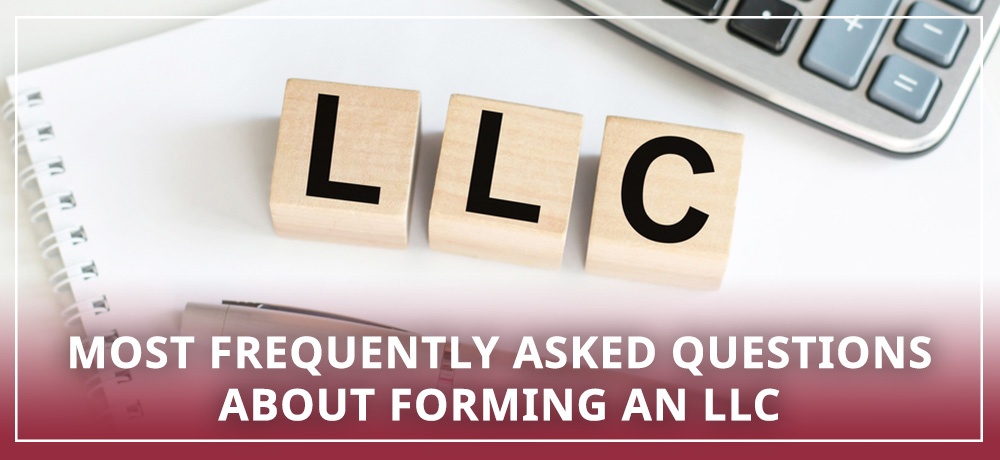Most Frequently Asked Questions About Forming An LLC

Becoming an entrepreneur is exciting as it’s the first step towards financial freedom. You also get to run a business you love, make all the decisions, and enjoy the tax benefits of forming a company.
However, when it comes to limited liability companies, there are a ton of questions clients have but often find answers difficult to come by.
Therefore, W R Howell, CPA, wants to arm you with the most accurate information available to help you make informed decisions. To do this, we’ve answered some of the most frequently asked questions about forming an LLC.
1. What is an LLC, and do I need one?
LLC stands for Limited Liability Company and is a type of business entity. LLCs were created to allow sole proprietors to operate an enterprise and have limited liability similar to a corporation but without having the record-keeping requirements of a corporation.
Any enterprise with potential liability to the owner should be operating under an LLC or corporation where the liability is limited to the entity’s assets and not the owner’s personal assets.
2. What is the difference between an LLC and a corporation?
A single-member LLC can file taxes as a sole proprietor (the default), while a multiple-member LLC will file the tax return as a partnership (the default). However, a corporation will file the tax return as a corporation on form 1120.
If the LLC wishes, it can file the proper forms with the IRS requesting to be recognized as a corporation and an S corporation. On the other hand, a corporation wishing to file as an S corporation only has to ask to be recognized as an S corporation (since it’s already a corporation).
It may sound confusing, but remember, an LLC is not a corporation in the eyes of the IRS but is treated as a disregarded entity. Therefore, it has to file as a sole proprietor (single member) or as a partnership (multiple members) unless it requests the IRS to recognize it as a corporation.
3. How do I pay the taxes if I have set up an LLC?
- If you create the LLC and do nothing else, then the taxes are filed (for a single-member LLC) on schedule C on the 1040 or (for a multiple-member LLC) as a partnership on form 1065.
- If it’s a multi-member LLC and files form 1065, then the income is reported to each partner on form K-1, which gets included on 1040 for the partners.
- If the LLC files as an S corporation, then the income gets reported to each shareholder on form K-1. It’s also recorded on form 1040.
Partnerships and S corporations are what are known as pass-through entities. They do not pay income tax, even though they file their own tax returns. The income gets reported on the owner’s tax return, where any tax owed is paid.
4. Am I paying into social security and medicare with my LLC?
It depends on how you file. If the taxes get reported on 1040, schedule C (single-member LLC default), then that income will be subject to self-employment tax (social security and medicare). Similarly, if the LLC gets filed as a partnership (multi-member default), then the income is subject to self-employment tax. But, if the LLC files as an S corporation, the answer is no, as income from an S corporation is not subject to self-employment tax.
5. What are the rules regarding LLCs filing as an S corporation and owners as employees?
The IRS rule says that S corporation owners should pay themselves as employees a reasonable salary. The definition of reasonable is not written in the tax code but comes from IRS court cases, which say a reasonable wage is what would be paid to an employee to do the same job as the owner.
6. How much does it cost to file the taxes if I own an LLC?
Again, it depends. If the taxes get filed on form 1040, schedule C, then the cost is for the one return (form 1040, with a schedule C). Keep in mind that two tax forms must be filled if the LLC files as an S corporation or partnership. Form 1120S gets filled for an S corporation (or 1065 if it’s a partnership) and form 1040 for an individual’s return.
We hope these answers made you feel more confident about forming a company. If you have any more questions about LLCs, get in touch with the experts at W R Howell, CPA. As the best accounting firm in Altamonte Springs, Florida, we provide efficient services that add value.
Our services include accounting, QuickBooks, business consulting, payroll, business incorporation, tax preparation, and planning services. We serve clients across Altamonte Springs, Casselberry, Sanford, Orlando, Longwood, Apopka, Winter Park, and the surrounding areas.
To learn more about how we can help you, please click here or contact us by clicking here.